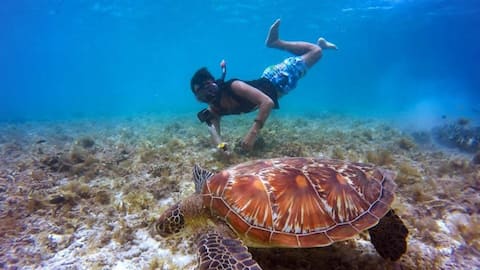Here's what you need to know as a first-time snorkeler
What's the story
Whether you're heading to a tropical destination or exploring your local coastline, snorkeling offers an exciting way to see the underwater world. For first-timers, gliding through clear waters and encountering colorful marine life can be thrilling yet intimidating. To enhance your snorkeling experience and boost your confidence, here are five facts that will help you better understand and enjoy this amazing adventure.
#1
Breathing through a snorkel is natural
One of the most common concerns for first-time snorkelers is the fear of breathing through the snorkel. However, it's completely natural! Your body instinctively knows how to breathe through your mouth, and once you get comfortable with the snorkel in your mouth, you'll find it easy to breathe while floating on the surface. Remember to stay calm, and take slow, deep breaths.
#2
Visibility changes with water conditions
Water clarity can vary greatly depending on various factors like weather, tides, and the time of day. Early morning is often the best time for snorkeling, as water conditions tend to be calmer and visibility is typically clearer. Don't be discouraged if you encounter murky water; sometimes, moving to a different spot can lead you to beautiful underwater vistas!
#3
Marine life is more active during different times
Different marine species exhibit varying levels of activity based on the time of day. Many fish are more active during dawn and dusk, making these times ideal for snorkeling. If you're hoping to see more colorful marine life, consider planning your snorkeling sessions around these times to increase your chances of spotting interesting sea creatures.
#4
Snorkeling gear is designed for comfort and safety
Modern snorkeling gear has evolved significantly, focusing on comfort and ease of use. Snorkels come with features like purge valves to clear water easily, while masks are designed to create a watertight seal and enhance your field of vision. Don't forget to wear a flotation device if you're not a confident swimmer; this will help keep you safe and relaxed while you explore.
#5
You can hear underwater
When snorkeling, you can hear sounds underwater much more clearly than on the surface because sound travels faster in water. This unique soundscape allows you to listen to the rustling of seaweed and the calls of marine life while avoiding the temptation to touch anything. By staying still and quiet, you can connect more deeply with the vibrant ecosystem surrounding you.
